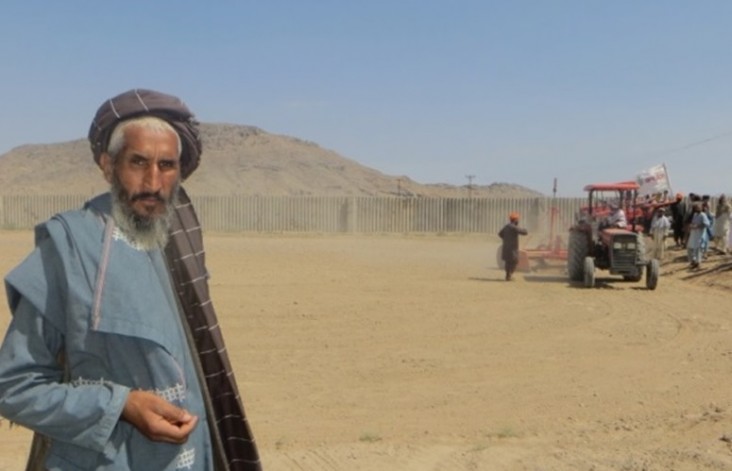
September 2015—Until recently, Afghan farmers in Zhari and Panjwayi districts in southern Kandahar province had been using local methods for leveling, plowing, irrigating and spreading seeds. They used animals to prepare their land for cultivation and spent days preparing a small piece of land for farming.
The farmers changed direction, however, moving from traditional to modern farming methods, after attending pre- and post-harvest and marketing training provided by USAID’s Kandahar Food Zone program. The training in Panjwayi district took place Oct. 18, 2014 to Feb. 5, 2015, and the training in Zhari district took place Jan. 4 to April 9 of this year.
Juma Khan, a farmer in Panjwayi, improved the efficiency of his farm production by applying the skills and technology he learned during the training. He recently attended an exhibition for farmers about modern and advanced agricultural machinery and bought two new tractors.
Khan now owns seven tractors and a small mechanical workshop. He uses the tractors to plow his farmland as well as renting them out to other farmers. He makes $80 (5,000 Afghan afghani) daily on average and provides 15 jobs for local people. Previously, Khan plowed the land with animals—a very time-consuming process. He worked with his two sons, and income from the farm was limited.
“It was a great experience participating in KFZ’s [Kandahar Food Zone’s] training. I learned how to modernize our farming system. I would not buy these tractors if I did not participate at this training,” Khan explained. “Modernizing our farming will strengthen our economy, attract foreign investment, and get farmers to stop cultivating poppies.”
USAID conducted these trainings to support the alternative livelihoods pillar of the Afghan Directorate of Counternarcotics in partnership with community representatives in Panjwyi, Zhari, Takhta-Pul, Kandahar City, Maiwand, Shahwali-Kot and Arghistan districts. In each district, 30 farmers were trained for three months.
The pre- and post-harvest and marketing training project helped farmers to improve their skills and discouraged them from growing poppy in their fields.
“In our district [Panjwayi], the poppy cultivation is decreased to 70 percent,” said Khan, referring to the decreased cultivation level over the past two years.
Kandahar Food Zone intervention programs are designed to support alternatives to poppy cultivation. The goal is to strengthen and diversify legal rural livelihoods in targeted districts by identifying and addressing the root causes and sources of instability that lead to opium poppy cultivation. Nearly 800 people have benefited from alternative livelihood activities of the two-year, $18.7 million program, which began in July 2013.
LINKS
Follow @USAIDAfghan, on Facebook, on Flickr, on YouTube







Comment
Make a general inquiry or suggest an improvement.